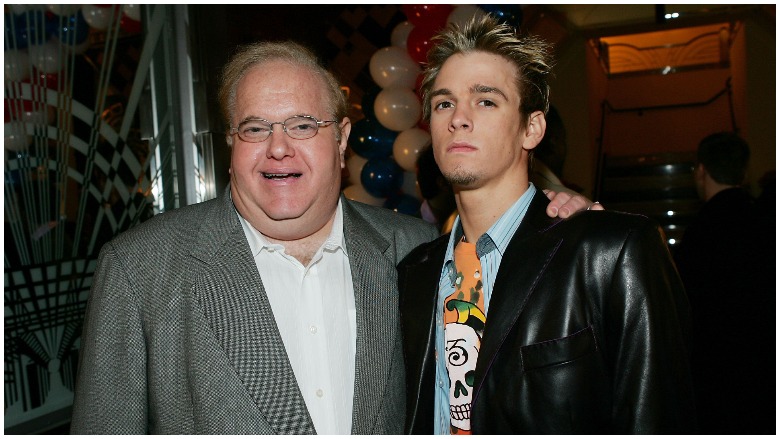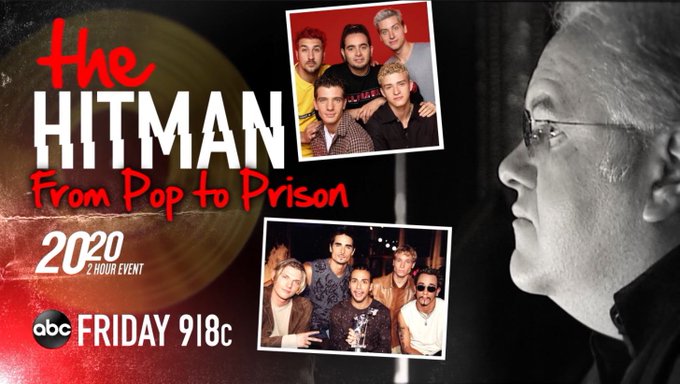
Getty Lou Pearlman and Aaron Carter
Lou Pearlman died in a federal prison from natural causes at age 62 where he was serving time for a Ponzi scheme related to his business as a boy band mogul.
He was convicted of fraud for swindling millions of dollars from thousands of investors, many of whom were retirees living in Florida, according to court filings in his case. He launched boy bands NSYNC, the Backstreet Boys, Take-5 and O-Town, promoting them with the investors’ money and keeping most of the profits for himself. All but one of the boy bands he launched sued Pearlman. Pearlman died with much of the money unpaid and lawsuits unresolved.
Pearlman’s story originally aired in a two-hour special of 20/20 Friday, December 13, 2019 in its episode, “The Hitman: From Pop to Prison.” The episode is airing again tonight, Friday July 3, 2020, at 9 p.m. on ABC.
Here’s what you need to know:
1. Lou Pearlman Died From a Heart Infection While Serving a 25-Year Federal Prison Sentence
Lou Pearlman died of an infection of the inner lining of his heart while serving a 25-year sentence in federal prison in Florida on August 20, 2016, according to the Associated Press. He was 62 years old at the time of his death.
Pearlman’s death came following complications from a condition that caused heart problems. The condition prevented his heart valve from fully opening. Pearlman went through surgery to have the heart valve replaced, but later contracted an infection, according to a report from the Miami-Dade Medical Examiner. The report was released less than one week after Pearlman’s death.
Pearlman’s Ponzi scheme through Trans Continental Airlines was first revealed in 2006. Two years later, he was convicted of fraud. Pearlman launched boy bands including NSYNC, the Backstreet Boys, O-Town and Take-5. The band members he managed received less than their fair share of the profits, and several band members even accused him of sexual misconduct. NSYNC, the Backstreet Boys and others filed lawsuits against him, but his death left those lawsuits open.
‘NSync singer Lance Bass tweeted after Pearlman’s death, “Word is that #LouPearlman has passed away. He might not have been a stand up businessman, but I wouldn’t be doing what I love today wout his influence. RIP Lou.”
2. Members of Lou Pearlman’s Boy Bands Expressed Conflicting Emotions When the Mogul Died
Lance Bass and Chris Kirpatrick, former members of *NSYNC, told ABC 20/20 they experienced a slew of emotions when Lou Pearlman died. Pearlman, the manager of *NSYNC, the Backstreet Boys and other boy bands, was a mogul in the music industry. He brought Bass and others to fame, even while keeping most of their earnings and duping investors.
Pearlman also faced allegations of sexual misconduct. Those allegations were first detailed in a 2007 Vanity Fair article. Pearlman had denied the allegations.
Bass said on 20/20 he credits Pearlman for his career, despite the fraud that funded it.
“There’s so many life lessons that you learn from everyone else’s mistakes – from your mistakes,” Bass said. “He helped start my career. He funded it… I don’t know where I’d be without him. So you have to give him that credit.”
Many of the band members sent out social media posts after learning of Pearlman’s death, which reflected their conflicting emotions.
“He might not have been a stand up businessman, but I wouldn’t be doing what I love today without his influence,” Bass wrote in a tweet the day after Pearlman’s death.
“I hope he found some peace,” Justin Timberlake wrote on Twitter August 21, 2016. “God bless and RIP, Lou Pearlman.”
“Mixed emotions right now, but RIP Lou Pearlman,” Kirkpatrick wrote on Twitter the day of Pearlman’s death.
3. Lou Pearlman’s Death at Age 62 Left Lawsuits Filed Against Him Unresolved
Lou Pearlman’s death at age 62 in federal prison left lawsuits filed against him unresolved. Bass told 20/20 Pearlman’s death in 2016 meant none of the victims in the $300 million Ponzi scheme received closure.
“I was so confused on exactly how to feel,” Bass said. “I’m like, ‘How could you die right now when we don’t have this closure?”
Kirkpatrick expressed similar mixed emotions on 20/20. He said he did not know how he should feel when he heard the news that Pearlman had died.
“The minute…you’d start to cry, you’d start to laugh,” Kirkpatrick said. “And the minute you’d start to laugh, you’d start to get angry, and the minute I was angry, I started to feel bad for the whole thing that happened. It was the most confusing moment probably that I’ve ever had. I know that a lot of the other guys are bitter. I understand that because like I said, it’s so many emotions. But…I wouldn’t be where I am if it wasn’t for him… and it sucks.”
4. Lou Pearlman Stole $300 Million from 2,000 Investors in an Elaborate Ponzi Scheme & Filed for Bankruptcy in 2010
Pearlman filed for Chapter 11 bankruptcy in 2010 on behalf of Trans Continental Airlines and Lou Pearlman Enterprises. His bankruptcy claim was denied later that year.
“The trustee’s complaint seeks to avoid allegedly fraudulent transfers from the debtors to Mercantile under Bankruptcy Code §§ 544(b), 548, 550, and comparable Florida state law. The complaint alleges, in short, that debtor Louis J. Pearlman and his co-debtor companies Trans Continental Airlines (“TCA”), Trans Continental Records (“TCR”), and Louis J. Pearlman Enterprises (“Enterprises”) perpetrated three different fraudulent money making schemes,” the bankruptcy filing said.
According to the bankruptcy filing, which you can read here, two of his three investment schemes used a Ponzi scheme model. The first was referred to as an Employee Investment Savings Account, or EISA program. Investors were promised high returns and told their investments were FDIC-insured.
“Pearlman and his cronies pocketed much of the investment funds and used new investments to repay or pay interest to prior investors in the EISA Program,” the bankruptcy filing said.
Pearlman compared himself to Bernie Madoff in a 2014 interview with The Hollywood Reporter, but said his Ponzi scheme was smarter.
“He didn’t have any real way to make money,” Pearlman said of Madoff, “but I had the music. Backstreet Boys each made well over $50 million apiece. I, of course, got my piece, and it was very nice and very substantial.”
5. Many of the Investors in Lou Pearlman’s Ponzi Scheme Were Retirees in Florida
The victims of Lou Pearlman’s $300 million Ponzi scheme did not receive closure because Pearlman died suddenly in prison, Bass told 20/20. Many of the investors in his Ponzi scheme were retired people living in Florida. Pearlman sold stocks in a company that did not exist, Trans Continental Airlines, and took out more than $150 million in bank loans by producing fraudulent documents, according to the court documents filed in Pearlman’s case.
A portion of Pearlman’s plea agreement said: “Pearlman made these misrepresentations to get money from the federally insured financial institutions. Pearlman did that because he had tremendous demands for cash from EISA investors and prior loans made by federally insured financial institutions. In sum, Pearlman ran his bank fraud scheme as another Ponzi scheme where he would use the financing that he obtained to make payments on other bank loans or to investors who were victims of his other Ponzi scheme.”
In 2014, nearly $40 million was recovered, and 4 percent of that was returned to Pearlman’s victims, according to The Hollywood Reporter. Part of Pearlman’s sentence involved restitution, and he could receive one year off his sentence for every $1 million he repaid to his victims.
READ NEXT: Lance Bass Now: Where Is the Former NSYNC Member Today in 2019?

